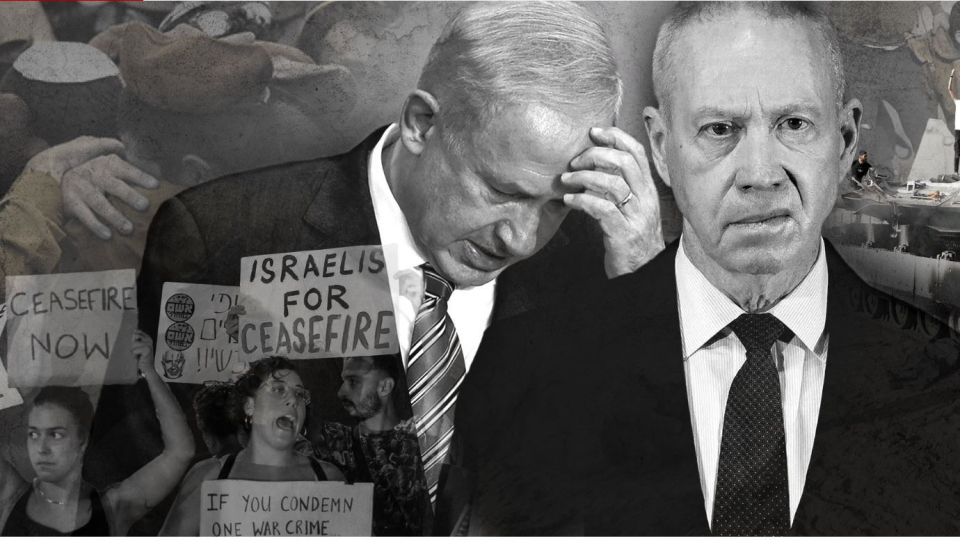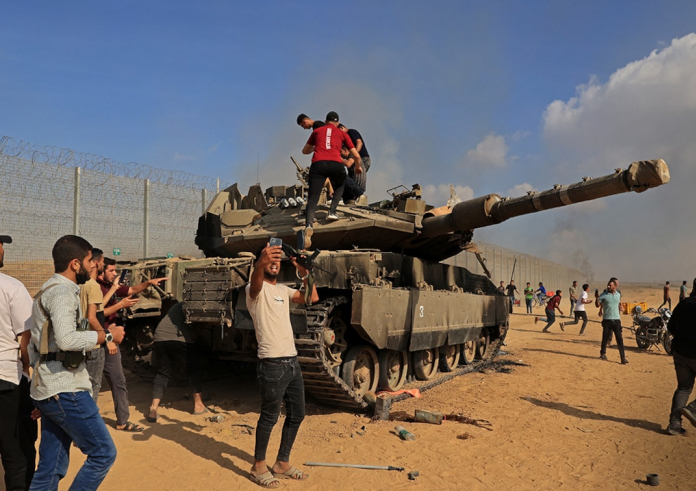Three months into Israel’s longest and costliest unconventional war, the country's armed forces have emerged as a significant indirect source of pressure on Prime Minister Benjamin Netanyahu's extremist government.
This development comes at a crucial juncture, both politically and in terms of security, for Tel Aviv. Amid ongoing internal differences over post-Gaza war strategies and proposed resolutions for Hamas's prisoner exchange demands, the negative shift in international and regional public opinion over Israel's 13-week Gaza assault has generated further stressors.
At the same time, the escalating situation on the northern front with Hezbollah has compelled the Israeli army to establish a committee to investigate the political, security, and military shortcomings that led to the 7 October Al-Aqsa flood operation.
This decision by the Israeli army has triggered a political uproar, particularly from a faction uncertain about how to deal with intensifying Palestinian resistance activities brought on by the formation of Netanyahu's coalition government - which is marked by extremism and controversial decisions, even by Israeli standards.
During a recent cabinet meeting, far-right and nationalist Zionist ministers slammed army Chief of Staff Herzi Halevi's decision to probe intelligence and operational failures leading up to the 7 October resistance operation, claiming that forming an inquiry commission during the ongoing Gaza war damages army and soldier morale.
Some cabinet members rallied to scuttle the selection of former Minister of Defence Shaul Mofaz as head of the inquiry commission, largely because of his role in Israel's unilateral Gaza disengagement plan in 2005.
Cracks in the coalition
The timing of the investigative committee's formation is underscored by Defense Minister Yoav Galant and emergency cabinet member Benny Gantz's vigorous defense of Halevi's decision. They emphasize its importance in learning from past mistakes, addressing security gaps, and preparing for potential wider conflicts, particularly with Hezbollah in Lebanon.
Less clear, however, is Netanyahu stance on the matter, despite the fact that he scheduled the session which was originally intended to be about post-war plans — a topic the prime minister appears reluctant to tackle given the potential risks to his political and personal future.
Netanyahu's right-wing cabinet members view the inquiry as a tool to further undermine an already precarious government. They recognize that the findings of the commission could be especially damning for their governing coalition, which, since its formation, has implemented an agenda focused on the oppression of Palestinians living under occupation and the strangulation of their national aspirations.
It is an agenda which security and military experts in Israel have consistently warned could heavily exacerbate the level of retaliatory violence against settlers and inflame the security situation, whether in the Gaza Strip or in the occupied West Bank and Jerusalem.
These elements are therefore trying, at Netanyahu's prompting, to postpone all discussions and investigations about the failures and causes that led to the Al-Aqsa Flood and its aftermath, as they expect to incur a substantial political cost from the probes.
Their opponents on these matters are figures favored by Washington, such as Halevi, Gallant, and Gantz. The latter, for instance, undoubtedly supported by the US, aspires to assume leadership in Israel's next political cycle, buoyed by favorable opinion polls and personal popularity over his main rival, Netanyahu.
Tensions also persist since before 7 October between two key Israeli figures - Netanyahu and Gallant - exacerbated by disputes over policy differences and their very different relationships with the US.
After the formation of Netanyahu's extremist coalition, the White House avoided him like the plague, during a time in which Gallant was welcome in Washington. Peeved by the slights, the Israeli prime minister sought to prevent his then-defense minister from visiting the US for security meetings. The dispute was recently revived over Netanyahu's alleged barring of Gallant from holding one-on-one meetings with the heads of Mossad and Shin Bet. That decision spilled into the public sphere, with the Israeli defense minister accusing the country's prime minister of “harming state security.”
As for army Chief of Staff Halevi, he maintains continuous and strong coordination with the US administration, and seeks to avoid being scapegoated for the political failures that have led to massive flare-ups in Palestinian areas: massacres in Nablus and Huwara last February, provocative Israeli incursions into Al-Aqsa Mosque, violent attacks by settlers - the horrors that essentially led up to the Palestinian resistance's Al-Aqsa Flood operation.
Eye on the North
Just as significant as the political dimensions of the upcoming inquiry is Israel's preparation for a potential conflict with Hezbollah along the northern border of occupied Palestine. Despite the Biden administration's diplomatic outreach to address the crisis of “displaced” Israeli settlers who have abandoned their homes to flee border clashes, at this juncture in the intensifying conflict, settler repatriation is impossible. But the political pressure from the many tens of thousands of homeless Israelis continues unabated - and, like their southern counterparts displaced by 7 October events, they are questioning all aspects of their military's competence.
The loss of confidence in Israel's deterrence capability therefore poses a challenge that the army is addressing by promoting new defense plans, and incurring substantial costs to fortify the settlements.
Simultaneously, US efforts led by special envoy Amos Hochstein, conducted through French channels, aim to persuade Hezbollah to retreat a few kilometers from the border. This proposal is part of a broader set of solutions that includes resolving Lebanon's dispute with Israel over 13 border points.
Undermining those efforts every step of the way is a growing Israeli chorus advocating for the reoccupation of southern Lebanon up to the Litani border as the only solution that would ensure the security of Israeli settlements. Recently, Yisrael Beiteinu leader Avigdor Lieberman proposed the occupation of southern Lebanon, placing the area between the Litani River and the border with occupied Palestine under Israeli control with UN supervision.
Recognizing the potential catastrophic consequences of a full-scale confrontation with Hezbollah which has formidable - and unknown - offensive, armament, and intelligence capabilities at its disposal, the Israeli military is keen on addressing the root causes of its recent failures before engaging in any further battles.
For its part, Hezbollah conditions any discussion about military actions with Israel on the cessation of the genocidal war on Gaza. The Lebanese resistance emphasizes that side actions intended to bait Hezbollah into war, such as targeting Hamas leaders in Lebanon, are not part of the debate.

















